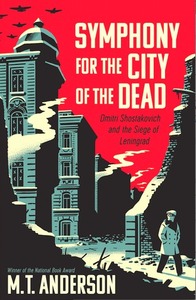Take a photo of a barcode or cover
370 reviews for:
Symphony for the City of the Dead: Dmitri Shostakovich and the Siege of Leningrad
M.T. Anderson
370 reviews for:
Symphony for the City of the Dead: Dmitri Shostakovich and the Siege of Leningrad
M.T. Anderson
I'm glad I finally read this. M.T. Anderson is one of my favorite authors, and I love the way he engages with history in his fiction. I knew nothing about the Russian front in WWII or the siege of Leningrad or about classical music, and I really enjoyed learning about it from this book. It's written with extreme compassion, which I always appreciate. Definitely worth reading.
Yep, Masterpiece. History, polictics, music and the horror of Stalin in a readable pager turner. I read it with Shostakovich symphonies (4th, 5th and 7th) blasting in the headphones. Incredible.
Haunting, horrifying and ultimately you have to admire and be thankful for what the people of Russia went through in order to survive the second world war with their humanity intact.
Took me forever to read because I had to take breaks from it. Feel the sheer density and intensity might turn away the intended audience, but that'd be a shame because it's so informative and interesting and well researched. The pictures truly add to the story. I've listened to some Shostakovich but now I'm intently listening with a new ear to the pieces Anderson talks about. Would be a great group read for a HS orchestra.
A majority of this book read like horror. I was not overly familiar with Russian history before reading this, knowing only that it had been described as terrifying, hence The Great Terror period under Stalin. Now that I have read this I feel as if the word "terrifying" is a gruesome understatement. I am so utterly stunned by the descriptions of those living during that time and through the Siege of Leningrad.
The choices they had to make that sometimes drove them to choose between morality and survival, themselves or their friends were heart-rending. Especially unnerving were the accounts of cannibalism, and the fact that it could be defined into two types (corpse eating vs people eating) - think eating someone who has died vs a starving grandmother trying to boil her granddaughter alive in a tub because she looks so plump and juicy. Or imagine if you were a mother during this time and being told to go to the police station to look through bins to find your child's clothing and tell the officer the number on that bin only to find out that the number indicated where your child had been EATEN.
I can only imagine the mental anxiety of those living in Russia at this time because no one was safe. The term "innocence" meant nothing. Often times people were forced to confess whatever the government wanted them to no matter how absurd or unfounded. You could be cheered and loved one moment only to rise straight to the top of the execution list the next. An example: Shostakovich was heading to a second meeting with his interrogator that he was sure was going to lead to his execution, only to find that the man's appointments had all been cancelled because he himself had just been executed.
*Don't for get the part about libraries! I was thrilled that Anderson included them.*
Despite the chaos and hardship, librarians were still doing their job dutifully for as long as they could. They kept their buildings open and helped their patrons any way they could, finding them books to read to occupy them from the horror, trying to find alternative ways to get nutrients when food was basically non-existent, looking for ways to make matches, and even just offering a place to go.
Listening to M.T. Anderson narrate this only made the emotional turmoil of this time in history root itself even deeper into mind. At first I tried listening to this in my car but his voice was so soft and quiet that I had to keep turning the volume up and up. Finally I resorted to my old CD player and headphones so I could hear it all more clearly, but his voice didn't change, it was just closer to my ears. This made it all the more intimate, as if Anderson were whispering secrets into my ears or retelling a horrifying story around a late night campfire.
The choices they had to make that sometimes drove them to choose between morality and survival, themselves or their friends were heart-rending. Especially unnerving were the accounts of cannibalism, and the fact that it could be defined into two types (corpse eating vs people eating) - think eating someone who has died vs a starving grandmother trying to boil her granddaughter alive in a tub because she looks so plump and juicy. Or imagine if you were a mother during this time and being told to go to the police station to look through bins to find your child's clothing and tell the officer the number on that bin only to find out that the number indicated where your child had been EATEN.
I can only imagine the mental anxiety of those living in Russia at this time because no one was safe. The term "innocence" meant nothing. Often times people were forced to confess whatever the government wanted them to no matter how absurd or unfounded. You could be cheered and loved one moment only to rise straight to the top of the execution list the next. An example: Shostakovich was heading to a second meeting with his interrogator that he was sure was going to lead to his execution, only to find that the man's appointments had all been cancelled because he himself had just been executed.
*Don't for get the part about libraries! I was thrilled that Anderson included them.*
Despite the chaos and hardship, librarians were still doing their job dutifully for as long as they could. They kept their buildings open and helped their patrons any way they could, finding them books to read to occupy them from the horror, trying to find alternative ways to get nutrients when food was basically non-existent, looking for ways to make matches, and even just offering a place to go.
Listening to M.T. Anderson narrate this only made the emotional turmoil of this time in history root itself even deeper into mind. At first I tried listening to this in my car but his voice was so soft and quiet that I had to keep turning the volume up and up. Finally I resorted to my old CD player and headphones so I could hear it all more clearly, but his voice didn't change, it was just closer to my ears. This made it all the more intimate, as if Anderson were whispering secrets into my ears or retelling a horrifying story around a late night campfire.
Wow. Such a moving audiobook, and my first real nonfiction audiobook and I thoroughly enjoyed it. I loved the way that the book went into what was going on in the war, and around Leningrad, and then went into what Shostakovich was doing. It was written more like fiction, than nonfiction, in the best way. Also having pieces of the symphony played behind the text was highly moving. This is the first audiobook that actually made me tear up. So great.
"When we read tales of atrocity, we all want to be the one who stood firm, who would not bend, who shouted the truth in the face of the dictator. [...] It is easy for us all to imagine we are heroes when we are sitting in our kitchens, dreaming of distant suffering."
This book is, quite simply, a testament to the power of music. Absolutely horrific, and absolutely wonderful.

"The whole of Leningrad heard the music that evening. A soldier in the Red Army wrote in his journal, "On the night of 9 August 1942, my artillery squadron and the people of the great frontline city were listening to the Shostakovich symphony with closed eyes. It seemed that the cloudless sky had suddenly become a storm bursting with music as the city listened to the symphony of heroes and forgot about the war, but not the meaning of war.""
"It was not only the Russians who reacted. The Germans listened too, as the music rose up through the leafy streets and above the gilt barrage balloons. It barked out of the radios in the Wehrmacht barracks. Years later, a German soldier told Eliasberg, "It had a slow but powerful effect on us. The realization began to dawn that we would never take Leningrad." That was enough in itself. "But something else started to happen. We began to see that there was something stronger than starvation, fear and death - the will to stay human.""
Bonus mentions for the heroics of Leningrad's librarians, who went above and beyond the call of public service to help Leningrad survive:
"The Leningrad Public Library remained open throughout the siege and became a place for people to congregate. "People came to the library to read, even when weak from cold and exhaustion," one of the librarians explained. "Some died in their places, with a book propped in front of them.""
"In the course of the war, the librarians greatly expanded the collection, purchasing books from the starving, who were desperate to sell anything for food. Some of the city's librarians scoured bombed ruins for volumes, scrabbling over the piles of brick with their backpacks full of salvaged books. [...] They still served patrons and sought out the answers to practical questions posed by the city government: alternative methods of making matches or candles, forgotten sources of edible yeast."
The scale of what Russia sacrificed in WWII was something I never learned or realized until the end of this book where Anderson explains:
"Historians now estimate that about 27 million Soviet citizens died during the conflict - more, in other words, than the dead of all other nations combined. [...] The Siege of Leningrad alone cost approximately one and a half million Russian lives - more than the combined World War II casualties of both the Americans and the British - a higher death toll, in fact, than the number of all Americans killed in battle in all wars fought since the United States' first founding."
This book is a must-read for anyone who has even the slightest appreciation of music and wants to learn more about Soviet or WWII history.
dark
emotional
informative
sad
medium-paced
Fascinating. I listened to the audio book. Lots of parts my students would love, but I think the sections on cannibalism may put it out of range.




